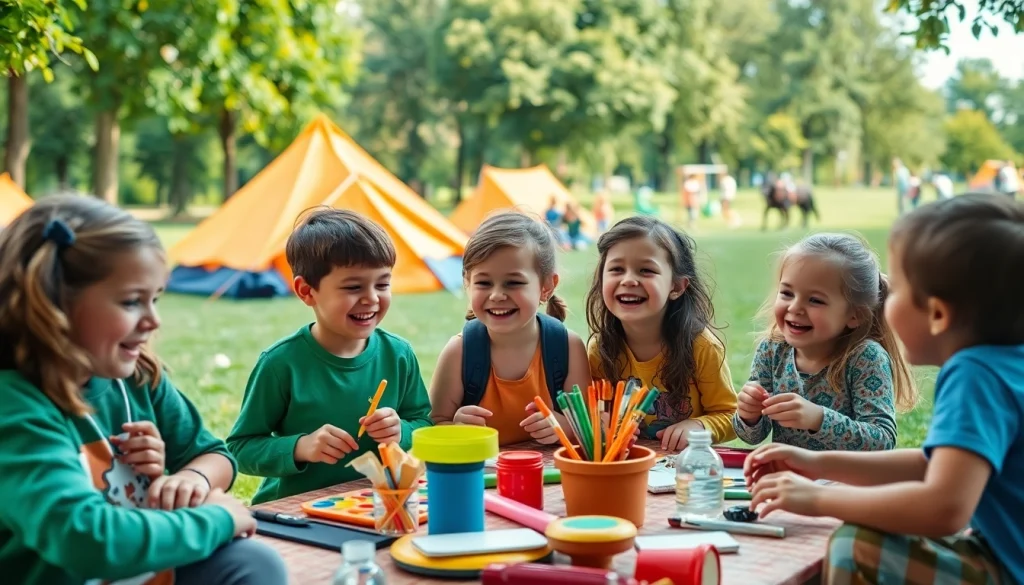Introduction to Holiday Camps
Holiday camps have become a staple in the leisure industry, especially in regions like the United Kingdom, where families seek engaging and enjoyable experiences for their children during school breaks. These camps offer a unique blend of activities that promote learning, creativity, and social interaction, providing children with memorable experiences that contribute to their personal development. For parents looking to enrich their children’s holidays, holiday camps present an ideal solution. In this article, we’ll explore what holiday camps are, the various types available, and the significant benefits they offer, along with tips for finding the perfect camp for your child.
What Are Holiday Camps?
Holiday camps are organized programs designed to provide recreational and educational activities for children during school breaks. Typically, these camps are hosted in dedicated facilities or outdoor environments, ranging from rural settings to urban centers. At their core, holiday camps focus on creating a fun-filled atmosphere where children can participate in various activities, learn new skills, and make friends while being supervised by trained staff members.
Unlike traditional vacation experiences, where families may travel to a destination, holiday camps allow kids to engage in structured activities without the need for travel. They often include elements like arts and crafts, sports, outdoor adventures, and even educational workshops, catering to a wide array of interests.
Types of Holiday Camps Available
Holiday camps come in several forms, each offering unique experiences tailored to different interests and age groups. Here are some common types of holiday camps:
- Sports Camps: Focused on promoting physical activity, sports camps offer training in various sports such as soccer, basketball, and swimming.
- Arts and Crafts Camps: These camps are dedicated to fostering creativity, allowing children to explore painting, sculpture, and various arts and crafts.
- Nature Camps: Emphasizing outdoor exploration, nature camps provide children with the opportunity to learn about wildlife, ecology, and environmental conservation.
- Academic Camps: Designed for learning enhancement, these camps focus on subjects like science, mathematics, and reading in an engaging environment.
- Specialized Camps: Catering to particular interests, these camps may focus on skills such as coding, cooking, or theater, allowing children to hone specific talents.
Benefits of Enrolling in Holiday Camps
The advantages of holiday camps extend far beyond mere entertainment. Here are some key benefits that make them a worthwhile investment in your child’s growth:
- Social Skills Development: Holiday camps provide children with a platform to socialize and interact with peers, enhancing their communication skills and teamwork abilities.
- Independence and Responsibility: By participating in a camp setting, children learn to manage themselves, take responsibility for their belongings, and make decisions independently.
- Diverse Experiences: Camps offer opportunities for children to engage in activities they may not typically encounter, fostering exploration and expanding their horizons.
- Physical Fitness: With various outdoor activities, holiday camps promote active lifestyles, helping to combat childhood obesity and instilling healthy habits.
- Fun and Relaxation: Above all, holiday camps create a playful and relaxed environment where children can unwind, have fun, and enjoy their break from school.
Choosing the Right Holiday Camp
Selecting the ideal holiday camp for your child can be a daunting process, given the multitude of options available. To ensure you make the best choice, consider the following factors:
Factors to Consider When Selecting a Camp
When exploring holiday camp options, keep these core factors in mind:
- Age Appropriateness: Ensure the camp activities are suitable for your child’s age to maximize their engagement and comfort level.
- Location: Consider camps that are conveniently located, whether close to home or in an area you’re willing to travel to for daily drop-offs.
- Cost: Examine the camp’s pricing structure and look for any additional fees. Ensure the value aligns with the activities offered.
- Duration: Evaluate how long the camp runs – week-long sessions, multiple weeks, or single-day options, depending on your needs.
- Insurance and Safety Standards: Check that the camp is accredited and maintains high safety standards and staff-to-child ratios.
Top Features of Quality Holiday Camps
Quality holiday camps incorporate various features that contribute to a well-rounded experience:
- Trained Staff: Instructors and counselors should be properly trained in both childcare and the specific activities they oversee.
- Structured Schedules: A balance of organized activities and free time helps children stay engaged while allowing for personal exploration.
- Diversity of Activities: High-quality camps provide a range of activities to cater to differing interests and to stimulate holistic development.
- Parent Communication: A good camp maintains open communication with parents, providing updates on their child’s progress and any incidents that may occur during the camp.
Reading Reviews and Parent Testimonials
Before committing to a holiday camp, make sure to research feedback from other parents and former campers. Online reviews, testimonials, and ratings can provide valuable insight into the camp’s overall quality and the experiences of previous participants. Consider visiting parenting forums or social media groups for personal stories, as they often reveal crucial information that can inform your selection process.
Activities Offered at Holiday Camps
The activities available at holiday camps play a significant role in shaping the overall experience. A well-curated program not only entertains but also fosters development across multiple areas:
Arts and Crafts Opportunities
Arts and crafts activities are a hallmark of many holiday camps. These opportunities allow children to express creativity and imagination. Activities could range from painting and sculpting to more intricate projects like beadwork or sewing. Such activities not only develop fine motor skills but also build confidence as children create tangible results from their efforts.
Sports and Physical Activities
Engaging in physical activities is vital to children’s development. Many holiday camps offer a variety of sports, including traditional team games like soccer and basketball, as well as individual pursuits such as swimming or martial arts. Sports promote teamwork, discipline, and perseverance, helping children learn the value of hard work and healthy competition.
Cultural and Educational Programs
In addition to sports and arts, many holiday camps have educational components, including workshops on cooking, science experiments, or cultural studies. These programs can spark interest in new subjects and provide an informal learning environment where children broaden their knowledge base while having fun.
Planning for Your Holiday Camp Experience
Preparation is key to ensuring your child has a positive experience at holiday camp. Here are actionable steps to help you plan accordingly:
What to Pack for a Successful Camp Experience
To help your child thrive at camp, consider packing the following:
- Comfortable Clothing: Ensure you pack weather-appropriate, comfortable clothing that allows for movement and outdoor activities.
- Essential Gear: Include any sports equipment or specialized gear required for specific activities.
- Personal Items: Pack sunscreen, water bottles, snack items, and any personal belongings your child might need, such as a favorite toy or book.
Preparing Your Child for Camp
Preparation extends beyond physical packing. Prior to the camp, sit down with your child and discuss what they can expect. Encourage them to share their feelings about attending camp, and address any potential concerns. Engaging your child in discussions about the activities they are excited to try can foster anticipation and ease anxiety.
Understanding Camp Policies and Procedures
Familiarize yourself with the camp’s policies and procedures, including drop-off and pick-up times, emergency procedures, and guidelines regarding communicating with the camp staff. Understanding these factors will ensure that both you and your child feel secure throughout the camp experience.
Conclusion: Making the Most of Holiday Camps
Participating in a holiday camp can provide children with invaluable experiences that extend far beyond the duration of their stay. Here’s how to maximize those experiences:
Encouraging Social Skills and Independence
As children interact with peers in a secure environment, they develop essential social skills and a sense of independence that can benefit them throughout their lives. Encourage your child to make new friends and try activities that push them out of their comfort zone.
Creating Lasting Memories
Holiday camps offer unique experiences that children are likely to remember fondly. Whether it’s building a majestic sandcastle, learning to swim for the first time, or participating in a talent show, these memories can last a lifetime. Share stories with friends and family to reinforce these cherished moments.
Finding Future Camps and Programs
The conclusion of one holiday camp doesn’t mean the end of the exploration. As the new school year approaches, keep an eye out for other camps and programs that align with your child’s interests. Many camps provide updates and early enrollment opportunities, so consider signing up early to secure a spot in their favorite programs.


